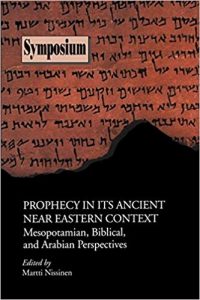Esta é uma tipologia proposta por David L. Petersen no ano 2000.
Os estudiosos da Bíblia, tanto no presente quanto no passado, criaram definições diferentes do que significa ser profeta. Aqui ofereço seis definições possíveis, usadas pelos estudiosos ao longo do século XX, que podem ajudar a preparar o cenário para uma nova era de estudos da literatura profética.
1. O profeta como alguém que tem uma intensa experiência do divino – O êxtase, como experiência pessoal dos profetas
2. O profeta fala ou escreve de maneira peculiar – A poesia é a marca característica da literatura profética
3. O profeta atua em um ambiente social específico – Os profetas seriam funcionários do culto
4. O profeta como portador de qualidades específicas como, por exemplo, o carisma – O profeta como carismático, em oposição ao sacerdócio que é institucional
5. O profeta como intermediário – Fenômeno que pode ser observado em outras culturas do Antigo Oriente Médio
6. O profeta como porta-voz uma mensagem específica – O profeta como campeão de uma rigorosa ética javista, porta-voz de uma mensagem de denúncia e anúncio
Essas são as principais opções-definições que se concentram na experiência religiosa, literatura característica, cenário social, carisma pessoal, papel do profeta como intermediário e mensagem específica. Contudo, apenas uma dessas tipologias, a noção de profeta como intermediário, parece abrangente o suficiente para ajudar a entender os profetas do Antigo Oriente Médio, incluindo aqueles atestados na Bíblia Hebraica e nos antigos textos babilônicos e neo-assírios.
Biblical scholars, both present and past have created different definitions of what it means to be a prophet. At the outset, I offer a six-fold typology of definitions that might help set the stage for a new period of studies in prophecy and prophetic literature.
1. The prophet has an intense experience of the deity – The rubric encompasses the analogy of ‘ecstatics’, an analogy that focuses on the psychology and personal  experiences of the prophets.
experiences of the prophets.
2. The prophet speaks or write in a distinctive way – Under this rubric falls the analogy of ‘poets’. This model emphasized the poetic nature of the prophetic literature.
3. The prophet acts in a particular social setting – This statement encompasses the model of ‘cultic functionaries’ for Israelite prophets.
4. The prophet possesses distinctive personal qualities, for example, charisma – Weber for instance, saw prophets as individuals who had an extraordinary power and authority that attracted loyal bands of followers. They exercised this authority by working predominantly outside of and in opposition to traditional institutions.
5. The prophet is an intermediary – Israelite prophecy as part of an observable occurrence (‘phenomenon’) shared widely throughout the ancient world and marked by some general practices, functions, and social dynamics.
6. The prophet has a distinctive message – Morality as the defining characteristic of prophetic religion and preaching. In this view, the Israelite prophets were bold champions of ethical religious practices, and stressed the individual and internal elements of religious experience.
These then are the primary options-definitions that focus on religious experience, distinctive literature, social setting, personal charisma, the prophet’s role as intermediary, and distinctive message. However, only one of these typologies, the notion of prophet as intermediary, seems comprehensive enough to help understand prophets throughout the ancient Near East, including those attested in the Hebrew Bible and in the Old Babylonian and Neo-Assyrian texts.
Cf. PETERSEN, D. L. Defining Prophecy and Prophetic Literature. In: NISSINEN, M. (ed.) Prophecy in its Ancient Near Eastern Context: Mesopotamian, Biblical, and Arabian Perspectives. Atlanta: SBL, 2000, p. 33-39. Disponível online.
